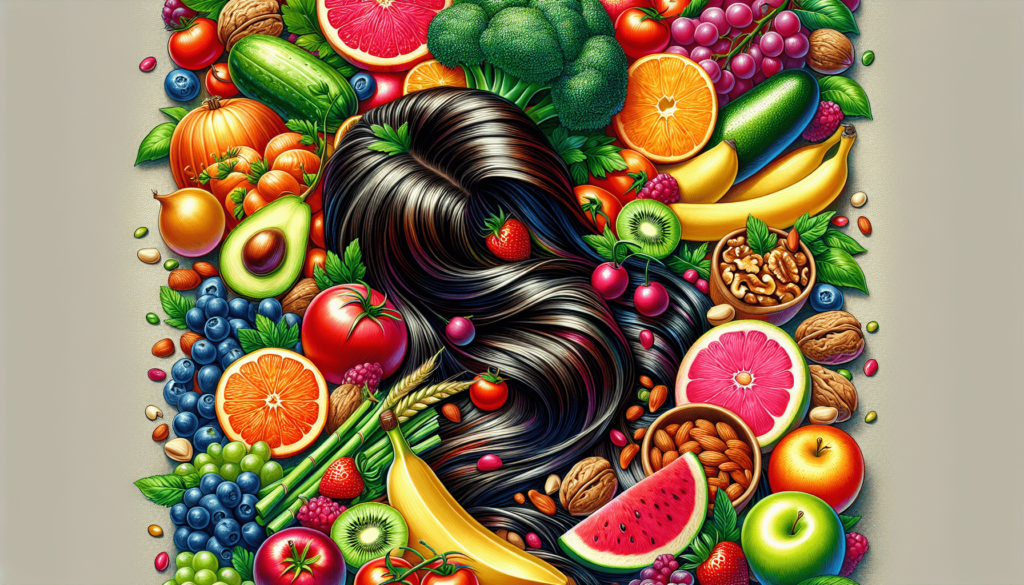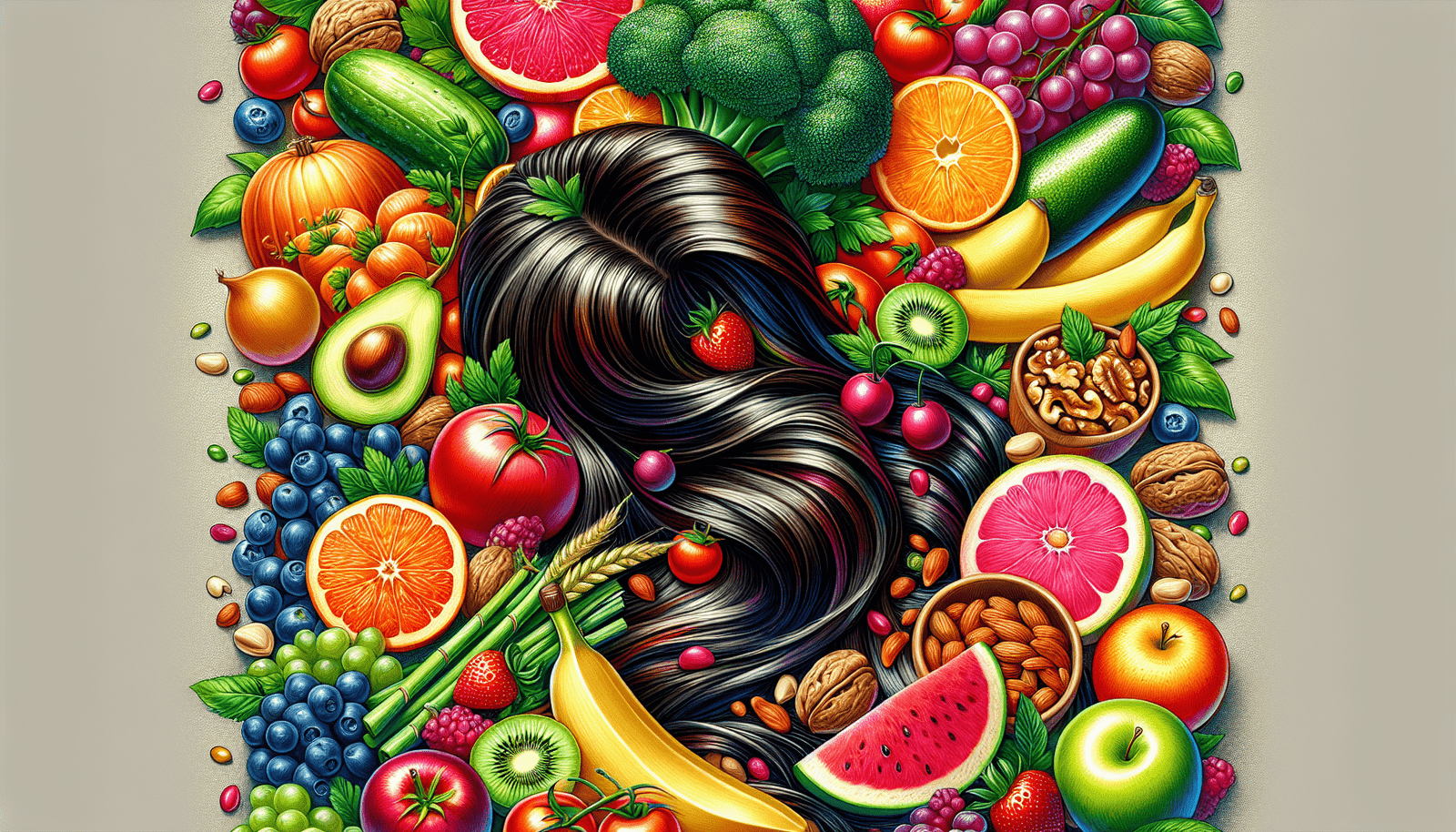Have you ever wondered how your diet affects the health of your hair?
When it comes to maintaining a luscious mane of hair, many people turn to various hair care products and treatments. However, the key to healthy hair may actually lie in something as simple as your diet. What you eat can have a significant impact on the health of your hair, from its strength and shine to its growth and texture. In this article, we will explore the fascinating relationship between diet and hair health, and provide you with tips on how to improve the overall health of your hair through your diet.

Hair Growth and Protein Intake
Protein is an essential macronutrient that plays a crucial role in the growth and repair of tissues, including your hair. Your hair is made up of a protein called keratin, so it’s important to consume an adequate amount of protein in your diet to support healthy hair growth. Incorporating protein-rich foods such as lean meats, fish, eggs, nuts, and legumes into your meals can help promote strong and healthy hair.
Essential Vitamins and Minerals for Hair Health
In addition to protein, there are several vitamins and minerals that are essential for maintaining the health of your hair. These nutrients play key roles in promoting hair growth, preventing hair loss, and enhancing the overall appearance of your hair. Some of the most important vitamins and minerals for healthy hair include:
- Vitamin A: Helps produce sebum, which keeps hair follicles moisturized.
- Vitamin C: A powerful antioxidant that helps protect hair follicles from damage.
- Vitamin E: Promotes blood circulation to the scalp, aiding in hair growth.
- Biotin (Vitamin B7): Supports the production of keratin, the protein that makes up your hair.
- Iron: Helps maintain healthy hair growth and prevents hair loss.
- Omega-3 Fatty Acids: Keep your scalp hydrated and promote healthy hair follicles.
By ensuring that your diet is rich in these essential vitamins and minerals, you can help support the overall health and vitality of your hair.
The Impact of Hydration on Hair Health
Staying hydrated is not only important for your overall health, but it also plays a vital role in maintaining the health of your hair. Dehydration can lead to dry, brittle hair that is more prone to breakage and damage. Drinking an adequate amount of water each day helps keep your hair hydrated and promotes a healthy scalp. Additionally, consuming hydrating foods such as fruits and vegetables can provide your hair with the moisture it needs to stay strong and shiny.
The Role of Antioxidants in Hair Health
Antioxidants are compounds that help protect your cells, including the cells in your hair follicles, from damage caused by free radicals. Free radicals are unstable molecules that can cause oxidative stress and damage to your hair, leading to issues such as hair loss and thinning. Consuming antioxidant-rich foods such as berries, leafy greens, and nuts can help neutralize free radicals and promote healthy hair growth.
The Importance of a Balanced Diet for Healthy Hair
Incorporating a wide variety of nutrient-dense foods into your diet is key to maintaining healthy hair. A balanced diet that includes a mix of lean proteins, colorful fruits and vegetables, whole grains, and healthy fats can provide your hair with the essential nutrients it needs to thrive. Avoiding crash diets or extreme restrictions can help prevent nutrient deficiencies that can negatively impact the health of your hair.
Foods to Incorporate for Healthier Hair
While it’s important to focus on a well-rounded diet for overall hair health, there are certain foods that are especially beneficial for promoting strong and luscious locks. Some foods that you may want to incorporate into your diet for healthier hair include:
| Food | Benefits |
|---|---|
| Salmon | Rich in omega-3 fatty acids, promotes scalp health |
| Spinach | High in iron and vitamins A and C, supports hair growth |
| Avocado | Contains healthy fats and vitamin E, moisturizes hair |
| Eggs | Excellent source of protein and biotin for hair growth |
| Sweet potatoes | Packed with beta-carotene, converts to Vitamin A for hair health |
| Almonds | High in biotin and vitamin E, nourishes hair follicles |
By incorporating these nutrient-rich foods into your diet, you can help support the health and vitality of your hair from the inside out.
Foods to Limit for Healthier Hair
While some foods can promote healthy hair growth, others may have a negative impact on the health of your hair. Foods that are high in sugar, unhealthy fats, and processed ingredients can lead to inflammation and oxidative stress, which can damage your hair follicles and impede hair growth. Limiting your intake of the following foods can help promote healthier hair:
- Sugary snacks and beverages: Can lead to inflammation and brittle hair.
- Fried and processed foods: High in unhealthy fats that can clog hair follicles.
- Excessive caffeine: Dehydrates the body and can lead to dry, brittle hair.
- Alcohol: Can affect nutrient absorption and hinder hair growth.
By reducing your consumption of these unhealthy foods, you can help create a more nourishing environment for your hair to thrive.
Lifestyle Factors That Impact Hair Health
In addition to your diet, there are several lifestyle factors that can also play a significant role in the health of your hair. Factors such as stress, smoking, lack of sleep, and over-styling can all contribute to hair issues such as breakage, thinning, and dullness. Taking steps to minimize these factors and prioritize self-care can help improve the overall health and appearance of your hair.
Stress Management Techniques for Healthier Hair
Chronic stress can have a negative impact on your hair health by disrupting the hair growth cycle and leading to hair loss. Implementing stress management techniques such as deep breathing, meditation, yoga, or regular exercise can help reduce stress levels and promote healthier hair growth. Taking time for self-care and relaxation can have a positive impact on both your mental well-being and the health of your hair.
The Importance of Hair Care Practices
While diet and lifestyle play a significant role in the health of your hair, it’s also important to pay attention to your hair care practices. Using gentle shampoos and conditioners, avoiding excessive heat styling, and protecting your hair from environmental damage can all help maintain the strength and vitality of your hair. Additionally, regular trims and treatments can help prevent split ends and breakage, promoting healthier hair overall.
Seeking Professional Advice for Hair Concerns
If you are experiencing hair issues such as excessive shedding, thinning, or dryness, it may be beneficial to seek advice from a healthcare provider or dermatologist. These professionals can help determine the underlying cause of your hair concerns and provide personalized recommendations for improving the health of your hair. From dietary changes to specialized treatments, there are a variety of solutions available to address common hair issues and promote healthier hair growth.
In conclusion, the relationship between diet and hair health is a complex and fascinating one. By nourishing your body with a balanced diet rich in essential nutrients, hydrating properly, and practicing good self-care habits, you can support the health and vitality of your hair from the inside out. Remember, healthy hair starts from within – so make sure to eat well, stay hydrated, and take care of yourself to keep your locks looking luscious and beautiful.

